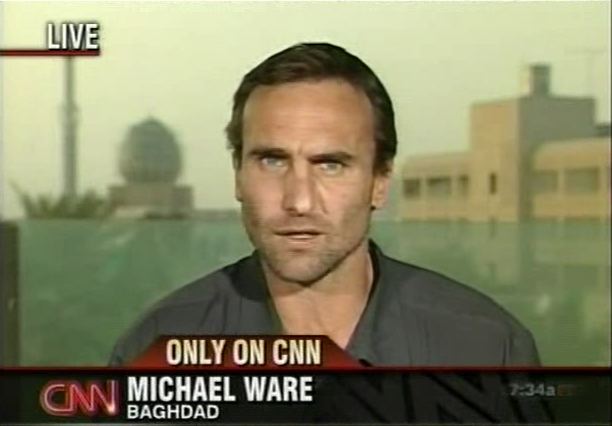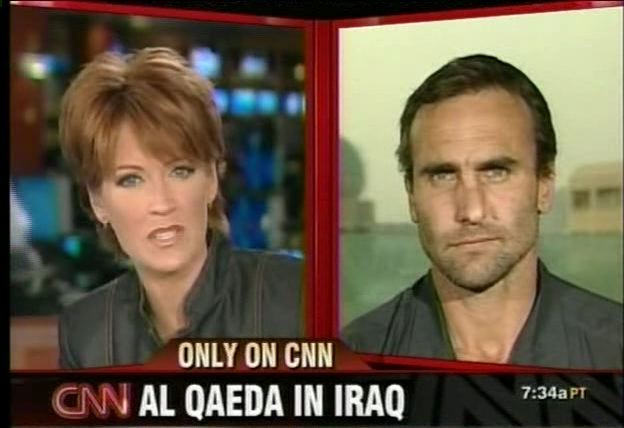NR: First replay, new interview

Click photo to play
Length: 6:40
HEIDI COLLINS: If al Qaeda wasn't in Iraq before the war, it is now. CNN's Michael Ware looks at the status of the terror group in Iraq. It's a story you will see only on CNN.
(BEGIN VIDEOTAPE)
MICHAEL WARE, CNN CORRESPONDENT (voice-over): Until now, most communications from al Qaeda in Iraq have been carefully crafted videos like this one. Showing the shooting down of a U.S. Apache helicopter. What's unprecedented about this video is we hear from al Qaeda in English.
UNIDENTIFIED MALE: Just to let you know, that our lives are nothing beside our religion. We will bomb everything.
WARE: Insurgent groups and the U.S. military now say al Qaeda has become the darkest core of Iraq's insurgency.
UNIDENTIFIED MALE: Just to let you know that we love to die as you love to live.
WARE: An organization so secretive that despite seized documents, intelligence and interrogations, the U.S. military still struggles to know how it works.
COL. SEAN MCFARLAND, 1ST BRIGADE, 1ST ARMORED DIVISION: We don't have a 100 percent understanding of that, and the enemy tries very hard to keep us from understanding.
WARE: There have been successes -- cells disrupted, leaders captured. And most stunning of all, the founder of al Qaeda in Iraq, Abu Musab al Zarqawi, executed in a U.S. air strike. But reality on the ground suggests the U.S. military is far from crippling the deadly network.
Abu Khaled al-Iraqi is a top commander from the powerful alliance of local Islamic insurgent groups. In his first television interview, he tells CNN Zarqawi's death brought change, but not what the U.S. had in mind. Instead, younger, even more radical al Qaeda leaders.
ABU KHALED AL-IRAQI (through translator): Al-Zarqawi is one person, and al Qaeda is thousands of people.
WARE: Local Sunni insurgent groups more moderate than al Qaeda and Iraqi nationalists, mostly from Saddam's former military, agree: al Qaeda is becoming stronger. Listen to this nationalist insurgent commander. He says al Qaeda's decentralized structure, seemingly endless money and growing support in and out of Iraq is overpowering local guerrilla groups.
ABU MOHAMMED (through translator): Al Qaeda's leadership is different. But as an idea, it has expanded. Because most other groups, pressured between U.S. forces and al Qaeda have had leaders killed or captured, and al Qaeda took over their fighters.
WARE: That's an assessment shared by many in the U.S. military. American commanders like Sean McFarland confront the al Qaeda-led insurgency every day.
MCFARLAND: What we're trying to do here is counteract the strong presence of al Qaeda that's intermixed with some lingering Baathist influence.
WARE: Four months ago, Abu Khaled's insurgent group was distancing itself from al Qaeda. Now, he says, there's no difference at all.
ABU KHALED (through translator): Al Qaeda works within the resistance and is part of the resistance.
WARE: The Sunni groups say fear of civil war with Shiites in control of the Iraqi government and unchecked Iranian interference is driving them to al Qaeda.
ABU MOHAMMED (through translator): America came to Iraq saying it would free us from tyranny and dictatorship, but that hasn't happened because the U.S. increased power of the Shia religious organizations, gave them the government, and we regard this as giving power to Iran.
WARE: If so, it is Zarqawi's most enduring legacy, his plan all along to spark sectarian conflict and draw Sunni insurgents to al Qaeda's cause. The insurgents say al Qaeda's hard line is gaining traction where there was little before.
ABU MOHAMMED (through translator): When the nationalist forces become weak, that leaves al Qaeda as a strong force in the area.
WARE: Yet the U.S. military is still hoping disillusioned moderate Sunnis reject al Qaeda.
MCFARLAND: Al Qaeda is herding them back toward us. So, to an extent, the Sunnis may be trapped between the devil and deep blue sea.
WARE: But Sunni insurgents know one day the United States will leave Iraq and they believe al Qaeda will not.
(END VIDEOTAPE)

Click photo to play
Length: 2:27
COLLINS: Michael Ware joining us now live from Baghdad.
And Michael, it seems like these more moderates that we're talking about here are having to make a choice between either going with the desires of the U.S. military or the desires of the insurgency. Which is it? How do they make that decision?
WARE: Well, there's a number of factors. I mean, what we're talking about here, particularly -- I mean, apart from the broader Sunni community, which is in the exact same position, and they're also drifting towards the hard line -- we're talking about members of Saddam's former military and his intelligence apparatus. The Baathists, the professional soldiers.
Now, the U.S. has been in secret negotiations or discussions with these people for 18 months now, Ambassador Khalizad is now talking openly about it. So these guys say we tested you out, we reached out to you and you have failed us and you've failed yourself. We're left with no choice. You let these pro-Iranians take over, you're going to leave us defenseless. Our only friend will be al Qaeda. We're now seeing that shift. They say we tried, you failed, you've left us no choice -- Heidi.
COLLINS: And you talk about the decentralized structure of all of that and the endless money. Where does the U.S. military go next? I mean, do you think that they're confident with knowing exactly where all that funding for this insurgency is really coming from?
WARE: Well, they admit that they only have broad ideas about the channels which bring the money in. It's generally known that they're tipping into traditional al Qaeda donors in oil-rich Gulf states. However, we're also seeing President Bush, in his recent speeches, put Iraq as the centerpiece of his global war on terror, which is odd, because so does Osama bin Laden.
And both of them, President Bush and bin Laden, point to Al Anbar province as the main front in that fight. And President Bush warned about al Qaeda's plans to take over the government there. Well, we already see evidence of that. They've so heavily infiltrated the Ramadi provincial government that they've capitalized, dominated the oil industry. And they control all oil distribution to the capital in that province. They are benefiting, according to the U.S., between $400,000 to $600,000 every month from that, and that goes to fund operations against Americans -- Heidi.
COLLINS: Well, it goes without saying it's getting more and more complicated every day. Michael Ware, live from Baghdad this morning. Michael, thanks.
